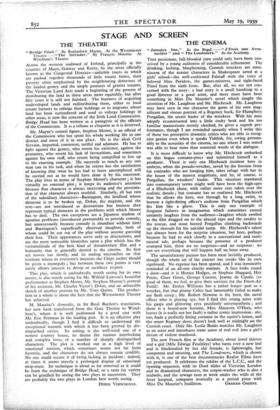STAGE AND SCREEN
THE THEATRE
"Bridge Head." By Rutherford Mayne. At the Westminster Theatre.--" The Intruder." By Francois Mauriac At Wyndham's Theatre.
ALONG the western seaboard of Ireland, principally in the counties of Mayo, Galway and Kerry, lie the areas officially known as the Congested Districts—unfertile tracts in which arc packed together thousands of little tenant farms, their poverty often emphasised by the neighbouring demesnes of the landed gentry and the ample pastures of grazier tenants. The Victorian Land Acts made a beginning of the process of distributing the land in these areas more equitably, but after fifty years it is still not finished. The business of acquiring undeveloped lands and redistributing them, either to local tenant farmers to enlarge their holdings or to migrants whose land has been surrendered and used to enlarge holdings in other areas, is now the concern of the Irish Land Commission. Bridge Head has been written as a panegyric of the officials of the Commission. It is a tribute as eloquent as it is deserved.
Mr. Mayne's central figure, Stephen Moore, is an official of the Commission who has spent his whole working life in one district and most of it in one place. He is the ideal Civil Servant, impartial, consistent, tactful and adamant. He has to fight against the gentry, who resent his existence, against the peasantry, who resent his lack of favouritism, and sometimes against his own staff, who resent being compelled to live up to his exacting example. He succeeds as much as any one man can in his task, and when he retires has the satisfaction of knowing that what he has had to leave uncompleted will be carried out as he would have done it by his successor. The play lives in terms of Stephen Moore's character ; it has virtually no external plot ; it keeps its audience's attention because that character is always interesting and the presenta- tion of that character always truthful. Similarly, all but two of the subsidiary characters—Barrington, the landlord whose demesne is to be broken up, Dolan, the migrant, and the rest—are not introduced as decorations but because they represent typical elements in the problems with which Moore has to deal. The two exceptions are a Japanese student of agrarian problems (introduced presumably to provide comedy, but unnecessarily because comedy is abundant without him) and Barrington's superficially observed daughter, both of whom could be cut out of the play without anyone guessing their loss. Their appearances serve only as distractions, and are the most noticeable blemishes upon a play which has the verisimilitude of the best kind of documentary film and a humanity that is generally denied to the cinema. Its first act moves too slowly, and its ending encroaches on that territory where in everyone's interests the Chips racket should be given a monopoly ; but between these two points it very rarely allows interest to droop or sacrifices respect.
This play, which is undoubtedly worth seeing for its own merits, is also worth seeing for Mr. Wilfrid Lawson's beautiful performance as Stephen Moore, Mr. Stephen Murray's portrait of his assistant, Mr. Charles Victor's Dolan, and an admirable sketch of another peasant by Mr. Tony Quinn. The produc- tion as a whole is about the best that the Westminster Theatre has achieved.
M. Mauriac's Asrnodge, in Sir Basil Bartlett's translation, has now been transferred from the Gate Theatre to Wynd- ham's, where it is well performed by a good cast with Mr. Eric Portman in the leading part. It is an effective play undoubtedly, though I find it difficult to understand the exceptional warmth with which it has been greeted by dis- tinguished critics. Its setting is the well-tried one of a remote country house, its theme the various interlocking and complex loves of a number of sharply distinguished characters. The plot is worked out at a high level of emotional tension, which sometimes seems not far from hysteria, and the characters do not always remain credible. No one could accuse it of being lacking in incident: indeed, at times it seems merely a prolonged display of emotional strip-tease. Its technique is about as far removed as it could be from the technique of Bridge Head, so a taste for variety can be gratified by seeing the two plays in succession. They are probably the two plays in London best worth seeing.
DEREK VERSCHOYLE.


















































 Previous page
Previous page